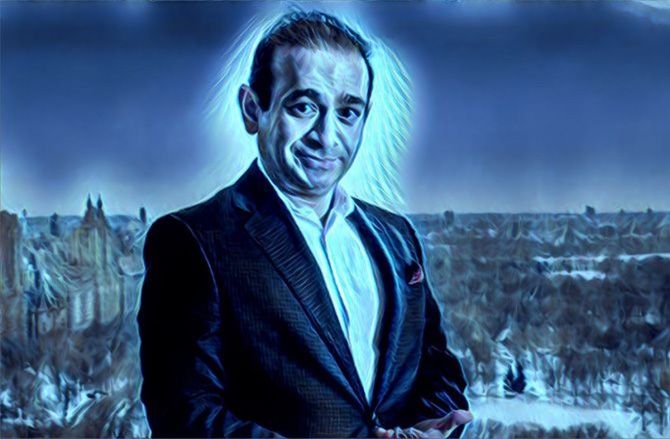'One cannot avoid speculating whether there was something else at play that led to the uncovering of this saga.'

Last month the British government agreed to extradite diamond merchant Nirav Modi to India.
Three years have passed since the Punjab National Bank scam broke out, in which Nirav Modi allegedly siphoned off more than Rs 11,000 crore (Rs 110 billion.
Modi had fled India in January 2018 one month before the scam was exposed, his whereabouts a mystery until British journalist Mick Brown ran into him on the streets of London.
Brown's two-minute video with Modi created an uproar. Modi was arrested and the Narendra Modi government began legal proceedings to have him extradited to India.
Journalists Danish Khan and Ruhi Khan have covered the Nirav Modi case extensively from London.
Their recent book -- Escaped -- True Stories of Indian Fugitives in London -- covers the Nirav Modi case in detail as well as those of other Indian fugitives who have taken shelter in London, right from liquor baron Vijay Mallya to Bollywood composer Nadeem Saifi, an accused in the 1997 murder of music magnate Gulshan Kumar.
In an e-mail interview with Rediff.com's Syed Firdaus Ashraf, Danish and Ruhi Khan discuss the Nirav Modi case and the possibility of him actually getting extradited to India.
The concluding segment of a two-part interview:
One wonders how India's elite were mixing and partying with Nirav Modi and no one had any idea about his shady business. Is the wealthy so ignorant about new wealth generators that they give access to their group with such ease?
Danish: In Escaped, we provide a background to Nirav Modi's family members and relatives, which show that he had access to social and cultural capital which aided his entry into the big league, which he always aspired to.
But at the same time, his flashy lifestyle, clever marketing, and effective PR campaigns were enchanting enough to not just the Indian, but also the international swish-set to get dazzled. No one bothered to reflect whether all that glittered was indeed gold or just dust.
The use of Letters of Undertaking to engage in fraud was going on since 2011 by Gokulnath Shetty, a mid-level manager of the PNB, and no one noticed it.
Isn't it surprising? What about bank audits? How come they missed it?
Ruhi: It is difficult to believe that Nirav Modi could have managed to do what he did taking only a few key mid-level PNB executives into confidence.
The larger question remains whether Nirav Modi had any kind of support or backing of people other than those in the PNB. So there are issues of lack of accountability and failure of regulatory mechanisms.
Nirav Modi's net worth was $1.8 billion in 2017. Did he ever tell the court that he was willing to pay back PNB if given time?
Danish: No, he made no such promise. His lawyers did argue that there was a freezing order in place on (Modi's) funds in accounts with EFG Bank (headquartered in Zurich, Switzerland) and all other entities are now in receivership or liquidation.
Mehul Choksi wrote an open letter stating that there was no fraud from his side and Nirav Modi's lawyers also maintain the same.
Can you tell us what is Nirav Modi's version of the story?
Does he say he had no intention to commit fraud as he was returning the money back to PNB from 2011 till 2017?
Ruhi: Yes. He has maintained that he has committed no fraud and the funds he received were pure commercial transactions and made good business for PNB.
If another co-accused and PNB staffer Gokulnath Shetty had not retired from his post, do you feel this fraud would never have come out in the open?
Danish: The nature of the discovery of the fraud shows that Modi perhaps believed he could have got away with the scam for a few more years and was on an expansion spree.
Shetty is an important player as per the Indian agencies so his retirement did facilitate the opening up of the lid on the fraud.
But on deeper reflection, one cannot avoid speculating whether there was something else at play that led to the uncovering of this saga.
The scam was unearthed on February 14, 2018, and Nirav Modi had left the country in January the same year. Was he alerted in advance and therefore he escaped?
Ruhi: Modi had been in the UK since December 2017 to meet investors, even before the alarm was raised at PNB in January 2018 and an official fraud was declared in February, making it highly possible that he had an inkling of what was to come.
Between the newsbreak and the Interpol red notice Modi had the opportunity to escape to any other destination. He chose to stay in London under the 'protection of the British system.'
Lastly, do you feel Nirav Modi is a cold-blooded fraudster or just someone who over-stretched his empire and could not repay bank money in time?
Danish: In our book Escaped, we weave a narrative based on facts and evidence that exists in these cases and have stayed away from giving our personal opinions.
As per the case put forward by the CBI and ED (enforcement directorate), this is an extraordinary but a rather straightforward case of fraud where credit was accessed without appropriate security. Repayment cannot be a cover for such blatant misuse of public funds.
The matter is still to go to trial in India, but UK courts seem to be convinced enough that Nirav Modi was possibly involved in threatening witnesses and destroying evidence.
Trial by media (and the authors), we believe, should be avoided.<









 © 2025
© 2025